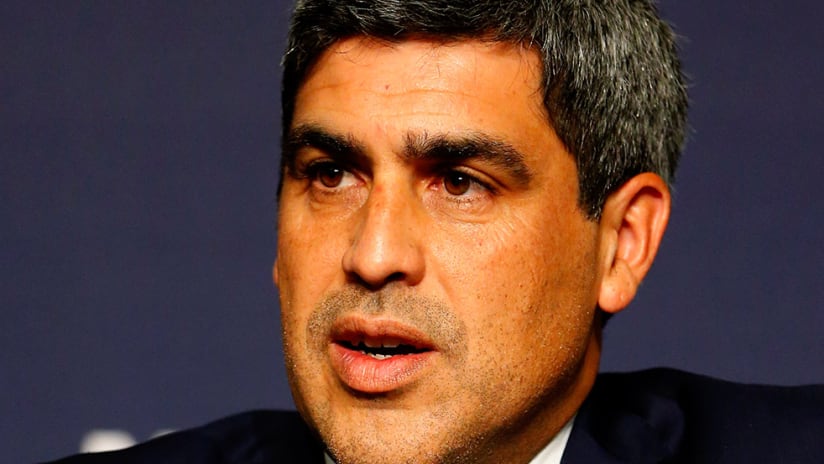NEW YORK – The problem isn’t with U.S. Soccer, it’s with soccer in the U.S., said New York City FC sporting director Claudio Reyna, who slammed “arrogant” youth coaches and called for a cultural change after the United States failed to advance to the 2018 FIFA World Cup.
“I don’t think we have the right behaviors in how we treat the sport in this country like it's treated in other countries around the world,” Reyna said Tuesday while speaking at the New York Soccer Initiative, where the club opened 10 new soccer fields.
The former US national team captain, who served as U.S. Soccer Youth Technical Director from April 2010 to May 2013, said he’s noticed the difference when he speaks with youth coaches in Europe and those in the United States.
“You go to local clubs in New York or pick anywhere in the country and you speak to a U-14 or U-15 technical director and they have all the answers, they know everything,” Reyna said. “They tend to be arrogant, they don’t want to listen, they don’t realize what they’re doing isn’t right.”
Reyna said there are quality players – both on the youth level and on the men’s national team. He cites the play of the US Under-17 team, which includes NYCFC Homegrown player James Sands, at the 2017 FIFA U-17 World Cup. He insisted the root of the problem is more cultural than tactical and he hopes that change can come from missing the first World Cup in 27 years.
“We have very good players in this country, I believe that. We have very good youth players in this country,” Reyna said. “Hopefully, for me more than anything it’s the behavior that changes in terms of the arrogance, the obnoxiousness, the lack of humility that exists in our country at all levels.”
Reyna also said change doesn’t happen with the appointment of one U.S. Soccer president or one national team coach.
“We need to focus more on progress and a lot less on politics and power and these kind of things and who is controlling what,” Reyna said. “For me, this is complete nonsense. … if we’re waiting for one person to make the difference, we’re kidding ourselves.”
That includes the upcoming race for U.S. Soccer president as Reyna declined to weigh in on the status of current president Sunil Gulati.
“I don’t have a comment on that,” Reyna said. “I don’t think one person is that important. I really don’t. For too long we were thinking one person is the reason, one head coach is going to change everything. It’s crazy to think like that. A national team coach should come in to make the national team better and qualify for World Cups. That’s it.”
Progress vs. growth
Reyna pointed to his background as a player, his humble beginnings of playing pickup soccer on dirt fields in New Jersey with garbage cans for goals. He said nothing was handed to him.
When he had the opportunity to compete in Europe in the pre-MLS days of 1994, he said he had to relearn the sport and wait his turn at Bayer Leverkusen in Germany.
“I didn’t play my first year in Europe,” Reyna said. “I didn’t call my agent to get me out and find me another club. I stuck there, my father told me to stick there and fight it out and the next year I played. I think we don’t have that enough now, the environments where players fight and stick it out. We make it easy for them.”
That’s not the case NYCFC, he said, where the academy players compete with older players and get a chance to train with the first team “to make it difficult.”
“That’s why our U-17s play U-19s, so they lose games,” Reyna said. “This is exactly what I tell the parents of the Academy when we have the orientation is to say that’s ok, that’s what we’re trying to create. You have across the country, academies playing only players at the oldest age groups so they could win. They could tell you whatever they want, but that’s the reality.”
Reyna also said the rapid growth and expansion of soccer in the United States, from new stadiums, to television deals to additional teams on various levels, doesn’t automatically translate to an improved product.
“For a long time, we’ve just been using those buzzwords thinking we’re progressing,” Reyna said. “For me, I’m not so sure we’re progressing as fast as we’re growing.”














